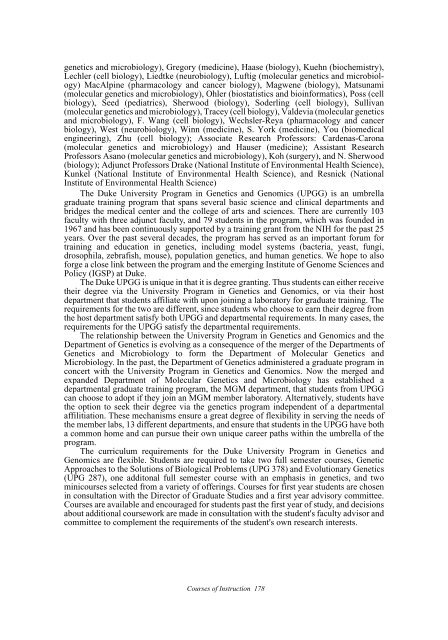Duke University 2008-2009 - Office of the Registrar - Duke University
Duke University 2008-2009 - Office of the Registrar - Duke University
Duke University 2008-2009 - Office of the Registrar - Duke University
Create successful ePaper yourself
Turn your PDF publications into a flip-book with our unique Google optimized e-Paper software.
genetics and microbiology), Gregory (medicine), Haase (biology), Kuehn (biochemistry),<br />
Lechler (cell biology), Liedtke (neurobiology), Luftig (molecular genetics and microbiology)<br />
MacAlpine (pharmacology and cancer biology), Magwene (biology), Matsunami<br />
(molecular genetics and microbiology), Ohler (biostatistics and bioinformatics), Poss (cell<br />
biology), Seed (pediatrics), Sherwood (biology), Soderling (cell biology), Sullivan<br />
(molecular genetics and microbiology), Tracey (cell biology), Valdevia (molecular genetics<br />
and microbiology), F. Wang (cell biology), Wechsler-Reya (pharmacology and cancer<br />
biology), West (neurobiology), Winn (medicine), S. York (medicine), You (biomedical<br />
engineering), Zhu (cell biology); Associate Research Pr<strong>of</strong>essors: Cardenas-Carona<br />
(molecular genetics and microbiology) and Hauser (medicine); Assistant Research<br />
Pr<strong>of</strong>essors Asano (molecular genetics and microbiology), Koh (surgery), and N. Sherwood<br />
(biology); Adjunct Pr<strong>of</strong>essors Drake (National Institute <strong>of</strong> Environmental Health Science),<br />
Kunkel (National Institute <strong>of</strong> Environmental Health Science), and Resnick (National<br />
Institute <strong>of</strong> Environmental Health Science)<br />
The <strong>Duke</strong> <strong>University</strong> Program in Genetics and Genomics (UPGG) is an umbrella<br />
graduate training program that spans several basic science and clinical departments and<br />
bridges <strong>the</strong> medical center and <strong>the</strong> college <strong>of</strong> arts and sciences. There are currently 103<br />
faculty with three adjunct faculty, and 79 students in <strong>the</strong> program, which was founded in<br />
1967 and has been continuously supported by a training grant from <strong>the</strong> NIH for <strong>the</strong> past 25<br />
years. Over <strong>the</strong> past several decades, <strong>the</strong> program has served as an important forum for<br />
training and education in genetics, including model systems (bacteria, yeast, fungi,<br />
drosophila, zebrafish, mouse), population genetics, and human genetics. We hope to also<br />
forge a close link between <strong>the</strong> program and <strong>the</strong> emerging Institute <strong>of</strong> Genome Sciences and<br />
Policy (IGSP) at <strong>Duke</strong>.<br />
The <strong>Duke</strong> UPGG is unique in that it is degree granting. Thus students can ei<strong>the</strong>r receive<br />
<strong>the</strong>ir degree via <strong>the</strong> <strong>University</strong> Program in Genetics and Genomics, or via <strong>the</strong>ir host<br />
department that students affiliate with upon joining a laboratory for graduate training. The<br />
requirements for <strong>the</strong> two are different, since students who choose to earn <strong>the</strong>ir degree from<br />
<strong>the</strong> host department satisfy both UPGG and departmental requirements. In many cases, <strong>the</strong><br />
requirements for <strong>the</strong> UPGG satisfy <strong>the</strong> departmental requirements.<br />
The relationship between <strong>the</strong> <strong>University</strong> Program in Genetics and Genomics and <strong>the</strong><br />
Department <strong>of</strong> Genetics is evolving as a consequence <strong>of</strong> <strong>the</strong> merger <strong>of</strong> <strong>the</strong> Departments <strong>of</strong><br />
Genetics and Microbiology to form <strong>the</strong> Department <strong>of</strong> Molecular Genetics and<br />
Microbiology. In <strong>the</strong> past, <strong>the</strong> Department <strong>of</strong> Genetics administered a graduate program in<br />
concert with <strong>the</strong> <strong>University</strong> Program in Genetics and Genomics. Now <strong>the</strong> merged and<br />
expanded Department <strong>of</strong> Molecular Genetics and Microbiology has established a<br />
departmental graduate training program, <strong>the</strong> MGM department, that students from UPGG<br />
can choose to adopt if <strong>the</strong>y join an MGM member laboratory. Alternatively, students have<br />
<strong>the</strong> option to seek <strong>the</strong>ir degree via <strong>the</strong> genetics program independent <strong>of</strong> a departmental<br />
affilitiation. These mechanisms ensure a great degree <strong>of</strong> flexibility in serving <strong>the</strong> needs <strong>of</strong><br />
<strong>the</strong> member labs, 13 different departments, and ensure that students in <strong>the</strong> UPGG have both<br />
a common home and can pursue <strong>the</strong>ir own unique career paths within <strong>the</strong> umbrella <strong>of</strong> <strong>the</strong><br />
program.<br />
The curriculum requirements for <strong>the</strong> <strong>Duke</strong> <strong>University</strong> Program in Genetics and<br />
Genomics are flexible. Students are required to take two full semester courses, Genetic<br />
Approaches to <strong>the</strong> Solutions <strong>of</strong> Biological Problems (UPG 378) and Evolutionary Genetics<br />
(UPG 287), one additonal full semester course with an emphasis in genetics, and two<br />
minicourses selected from a variety <strong>of</strong> <strong>of</strong>ferings. Courses for first year students are chosen<br />
in consultation with <strong>the</strong> Director <strong>of</strong> Graduate Studies and a first year advisory committee.<br />
Courses are available and encouraged for students past <strong>the</strong> first year <strong>of</strong> study, and decisions<br />
about additional coursework are made in consultation with <strong>the</strong> student's faculty advisor and<br />
committee to complement <strong>the</strong> requirements <strong>of</strong> <strong>the</strong> student's own research interests.<br />
Courses <strong>of</strong> Instruction 178









